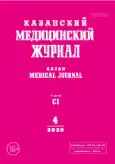Уровень липополисахарид-связывающего белка при острых кишечных инфекциях и влияние интерлейкинов-1β и -10 на его синтез
- Авторы: Епифанцева Н.В.1, Емельянова А.Н.1, Калинина Э.Н.1, Караваева Т.М.1
-
Учреждения:
- Читинская государственная медицинская академия
- Выпуск: Том 101, № 4 (2020)
- Страницы: 590-594
- Тип: Обмен клиническим опытом
- URL: https://journal-vniispk.ru/kazanmedj/article/view/34075
- DOI: https://doi.org/10.17816/KMJ2020-590
- ID: 34075
Цитировать
Аннотация
Цель. Определить уровень липополисахарид-связывающего белка при острой кишечной инфекции в зависимости от этиологии и тяжести течения заболевания, установить влияние уровня интерлейкинов-1β и -10 на экспрессию липополисахарид-связывающего белка.
Методы. Проведено исследование сыворотки крови 62 пациентов с определением концентрации липополисахарид-связывающего белка, интерлейкинов-1β и -10 методом твердофазного иммуноферментного анализа с использованием набора реактивов ELISA (США) и Вектор-Бест (г. Новосибирск). В первую группу вошли 33 пациента с бактериальной кишечной инфекцией, вторую группу составили 29 пациентов с вирусными диареями, группа контроля — 20 условно здоровых человек. Статистическая обработка осуществлена при помощи электронных программ Microsoft Excel 2010 и Statistica 6.0, с определением статистической значимости различий при достигнутом уровне р ≤0,05 с использованием критерия Манна–Уитни (U-тест). При расчёте корреляционных связей использовали коэффициент Спирмена. Оценка распределения признаков проведена с помощью критерия Шапиро–Уилка W.
Результаты. В процессе работы нами установлено наличие липополисахарид-связывающего белка во всех исследуемых группах, при этом в группе бактериальных кишечных инфекций отмечено значительное повышение содержания липополисахарид-связывающего белка в сравнении с другими группами. При рассмотрении уровня этого белка в зависимости от степени тяжести наибольшие показатели зарегистрированы при лёгком течении острых кишечных инфекций бактериальной природы, при вирусных диареях колебания липополисахарид-связывающего белка не превышали норму. При бактериальных кишечных инфекциях установлена прямая взаимосвязь липополисахарид-связывающего белка с интерлейкинами-1β, -10.
Вывод. Определение концентрации липополисахарид-связывающего белка можно использовать для первичной дифференциальной диагностики кишечных инфекций, вызванных бактериальными агентами, что позволит значительно сузить диагностический поиск и определить тактику этиотропной терапии; также, учитывая взаимосвязь уровня липополисахарид-связывающего белка со степенью тяжести, данный показатель можно использовать в качестве прогностического признака течения заболевания.
Ключевые слова
Полный текст
Открыть статью на сайте журналаОб авторах
Наталья Владимировна Епифанцева
Читинская государственная медицинская академия
Автор, ответственный за переписку.
Email: en1608@yandex.ru
Россия, г. Чита, Россия
Альвина Николаевна Емельянова
Читинская государственная медицинская академия
Email: en1608@yandex.ru
Россия, г. Чита, Россия
Эльвира Николаевна Калинина
Читинская государственная медицинская академия
Email: en1608@yandex.ru
Россия, г. Чита, Россия
Татьяна Михайловна Караваева
Читинская государственная медицинская академия
Email: en1608@yandex.ru
Россия, г. Чита, Россия
Список литературы
- Гюлазян Н.М., Белая О.Ф., Малое В.А. и др. Липополисахариды/эндотоксины грамотрицательных бактерий: роль в развитии интоксикации. Эпидемиол. и инфекц. болезни. 2014; (2): 11–16.
- Саванович И.И., Зенова Н.Г., Пучкова Н.В. Липополисахарид-связывающий протеин и растворимый CD14 как показатели микроэкологического нарушения в системе грамотрицательная флора и макроорганизм при функциональных нарушениях ЖКТ у детей. Мед. ж. 2007; (4): 96–98.
- Мавзютов А.Р., Мавзютова Г.А., Бондаренко К.Р. и др. Характер изменений уровня липополисахарид-связывающего белка при различных инфекционных процессах и дисбиозах. Ж. микробиол., эпидемиол., иммунобиол. 2011; (2): 66–72.
- Бондаренко В.М., Рябченко Е.В., Веткова Л.Г. Молекулярные аспекты повреждающего действия бактериальных липополисахаридов. Ж. микробиол., эпидемиол., иммунобиол. 2004; (3): 98–105.
- Зубова С.В., Грачёв С.В., Прохоренко И.Р. Участие Toll-подобного рецептора 4 в интернализации бактерий Escherichia coli нейтрофилами крови человека в присутствии липополисахаридов. Мед. иммунол. 2012; (3): 219–222. doi: 10.15789/1563-0625-2012-3-219-222.
- Самуилова Д.Ш., Боровкова У.Л. Липополисахарид-связывающий белок: основные функции и клиническое значение. Клин. физиол. кровообращения. 2013; (4): 5–9.
- Baillie J.K., Arner E., Daub C. et al. Analysis of the human monocyte-derived macrophage transcriptome and response to lipopolysaccharide provides new insights into genetic aetiology of inflammatory bowel disease. PLoS Genet. 2017; 13 (3): 1006641. doi: 10.1371/journal.pgen.1006641.
- Schmitz J., Owyang A., Oldham E. et al. IL-33 an Interleukin-1-like cytokine that signals via the IL-1 receptor-related protein ST2 and induces T helper type 2 — associated cytokines. Immunity. 2005, 23: 479–490. doi: 10.1016/j.immuni.2005.09.015.
- Peñalozaa H.F., Schultza B.M., Nietoa P.A. et al. Opposing roles of IL-10 in acute bacterial infection. Cytokine Growth Factor Rev. 2016, 32: 17–30. doi: 10.1016/j.cytogfr.2016.07.003.
Дополнительные файлы






